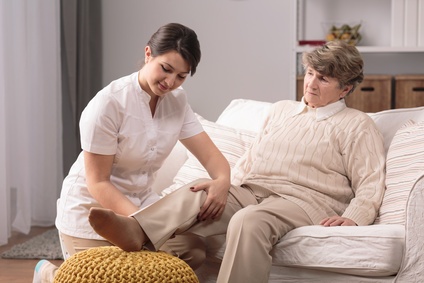Fall-related injuries are a significant concern for older people. About 1 in 4 Americans aged 65 or older fall every year, according to the National Council on Aging and the Centers for Disease Control and Prevention (CDC).
Falls are the most common cause of non-fatal trauma and the leading cause of fatal injury in the elderly. Often, they lead to expensive ER trips, short-term rehab stays, long surgical recoveries, and further physical decline.
Natural body changes, chronic diseases, and polypharmacy, the simultaneous use of several medications, all common in older people, increase the likelihood of falling and injuring oneself.
Even the fear of falling can negatively affect an older loved one’s quality of life, the National Council on Aging reported. Many older people so fear falling that they curtail healthy activities like walking, exercising, and socializing. That, in turn, causes some to suffer further physical decline and clinical depression.
It is a good idea to take a moment and discuss ways that you can help your aging parent or grandparent prevent falls and fall-related injuries.
First, assess their risk
There are many factors you should consider when determining a loved one’s risk of falls:
• Do your aging relatives live independently?
If your loved ones live in their own home, you need to make sure that they have the appropriate level of supervision, without impinging on their dignity.
Do they have a life monitoring service? If they live far from you, are there other family members, friends, or trusted neighbors who are willing to regularly check in on them?
• If your aging relative lives in your home, does your work/school schedule mean he or she will spend a lot of time alone?
The more time an older loved one spends alone, the greater the risk he or she could incur a serious fall-related injury.
• Has your relative fallen in the past?
Past falls are a strong predictor of future fall risk. If your relative has a history of falling, it might not be wise for him or her to continue living independently. A move to a retirement community might be something your family should consider.
• How is your loved one’s eyesight, hearing, and mobility?
If your loved one has a physical or sensory impairment, he or she is more likely to lose balance or trip over an obstacle and fall.
• Does he or she take a lot of medications?
Polypharmacy increases the risk of unintended drug reactions and drug interactions. Often, the symptoms of an adverse drug reaction include dizziness, light-headedness, disorientation, and unsteadiness — all of which can precipitate a fall.
And some drugs like blood pressure regulators, painkillers, anti-anxiety medications, and antihistamines can cause dizziness or light-headedness all by themselves.
Make sure that you’re keeping close tabs on how your relative’s medications affect his or her balance and alertness, and work with your family doctor to minimize adverse drug interaction risks.
• Is the home environment optimized for fall safety?
If your aging relative’s residence has a lot of stairs, is cluttered with furniture or knick-knacks, has narrow corridors or slippery floors, a trip-and-fall injury is much more likely.
Be sure that someone is looking after the outside of the home
If your older loved ones live in their own home and aren’t able to clear yard debris, shovel snow, spread salt, and so on, make sure someone — a younger family member or neighbor, or hired service — is available to do so.
If your aging relative lives in your home, make sure you properly maintain the outside areas. An icy porch, wet leaves on stairs or sidewalks, or fallen twigs, seeds, or tree nuts can all present significant obstacles to an older person with limited mobility.
Make some simple changes around the house
1.) If your parent or grandparent has limited mobility, items that he or she needs every day – food, clothes, toiletries, cleaning supplies, etc. – should be rearranged so that they’re within easy reach.
2.) If you can’t lower shelves and cabinets, buy him or her an adjustable reacher to use around the house. They’re available at your local pharmacy or medical supply store.
3.) If the home has a staircase that’s tough for your relative to climb, install a chairlift system, or consider moving your relative’s sleeping and living areas to the first floor.
4.) Install handrails in hallways and next to fixtures or furniture like beds, chairs, tubs, and toilets.
5.) Put non-slip mats in bathrooms, tubs and heavily travelled areas that feature hardwood or slick tiled floors.
6.) If there are bubbles in the carpet, tack them down. Minimize the number of throw rugs (it’s easy for a person with limited mobility to trip over the lip of a rug).
7.) Rearrange furniture to allow for wider passages, especially if your aging loved one uses a walker, cane, or wheelchair.
8.) Install more lighting – nightlights, recessed lighting, or standalone corner lamps in the home.
9.) Work with an occupational therapist — or with an architect or interior designer who specializes in aging-in-place needs — to find ways to make the home safer.
Help your aging loved one avoid a fall.
Use the tips above to make your relative’s home environment safer. Fall prevention begins in the home. The more vigilant you are, the more likely your aging parent or grandparent will live well into the future!













